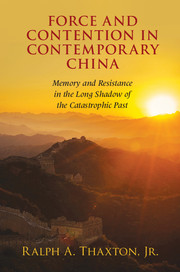 Force and Contention in Contemporary China
Force and Contention in Contemporary China Book contents
- Frontmatter
- Dedication
- Contents
- List of Illustrations
- Acknowledgments
- Cast of Characters for Da Fo Village and Several Other Villages in the Hebei-Shandong-Henan Border Area, 1945–2013
- Maps
- Introduction
- 1 The Violent Dawn of Reform
- 2 Contemporary Tax Resistance and the Memory of the Great Leap
- 3 Birth Planning and Popular Resistance
- 4 Rural Schools and the “Best Citizens of the State”: The Struggle for Knowledge and Empowerment in the Aftermath of the Great Leap
- 5 Official Corruption and Popular Contention in the Reform Era
- 6 The Rise of the Electricity Tigers: Monopoly, Corruption, and Memory
- 7 The Defeat of the Democratic Experiment and Its Consequences
- 8 Contentious Petitioners and the Revival of Mao-Era Repression
- 9 Migration and Contention in the Construction Sector
- 10 The Rise of the Martial Artists and the Two Faces of Mafia
- Conclusion: Big Questions and Small Answers from Da Fo
- Bibliography
- Index
- Miscellaneous Endmatter
9 - Migration and Contention in the Construction Sector
Published online by Cambridge University Press: 05 August 2016
- Frontmatter
- Dedication
- Contents
- List of Illustrations
- Acknowledgments
- Cast of Characters for Da Fo Village and Several Other Villages in the Hebei-Shandong-Henan Border Area, 1945–2013
- Maps
- Introduction
- 1 The Violent Dawn of Reform
- 2 Contemporary Tax Resistance and the Memory of the Great Leap
- 3 Birth Planning and Popular Resistance
- 4 Rural Schools and the “Best Citizens of the State”: The Struggle for Knowledge and Empowerment in the Aftermath of the Great Leap
- 5 Official Corruption and Popular Contention in the Reform Era
- 6 The Rise of the Electricity Tigers: Monopoly, Corruption, and Memory
- 7 The Defeat of the Democratic Experiment and Its Consequences
- 8 Contentious Petitioners and the Revival of Mao-Era Repression
- 9 Migration and Contention in the Construction Sector
- 10 The Rise of the Martial Artists and the Two Faces of Mafia
- Conclusion: Big Questions and Small Answers from Da Fo
- Bibliography
- Index
- Miscellaneous Endmatter
Summary
The second decade of the Deng-led reform brought up bittersweet memories of the Great Leap Forward, when Da Fo's famers were promised that the changeover to the commune would deliver a better life, only to be flattened by a dwindling food ration and exhaustion from overwork in the collective fields. The disbanding of the collective was more than welcomed by villagers, many of whom equated reform with permission to rescue themselves from the restrictive and demeaning labor regime of the Mao era. With reform, Da Fo's farmers were quicker to rise for work each morning, more eager to engage tilling and petty trade, and more hopeful that each day's increment of labor would distance them from the damage of the past.
This hope was still alive in the mid-1990s. But, as we have seen, fifteen years of reform had resulted in a renewed tax burden, another radical assault on procreation, and a rise in tuition payments – all piled onto, and entwined with, the fines, bribes, and extortions of Liangmen township leaders and public security forces. By 1995, Da Fo's farmers were working longer and harder to feed the rent collectors of the reform-era political system, and daily survival was again encumbered by a single-party state whose agents were undermining democratic institutional experiments and closing down avenues of supposedly legitimate remonstration. Fortunately, the existential dilemma of Da Fo's farmers was not as dire as in the Great Leap, for they now had the option of exit: they could flee with minimal penalty. Flight, therefore, became the order of the day. Increasingly, as the second decade of reform wore on, Da Fo's hard-pressed farmers joined in the greatest internal migration in human history, supposedly stimulated by the pull of reform policy.
PUSH FACTORS
By the early twenty-first century, approximately 120–130 million rural migrants had left the countryside to find work in emerging towns and cities benefiting from China's economic boom. Of the forty million migrants laboring in the construction industry, nearly 70 percent were of rural origin. Few of them held the residential permits required to stay in the cities without police harassment.
- Type
- Chapter
- Information
- Force and Contention in Contemporary ChinaMemory and Resistance in the Long Shadow of the Catastrophic Past, pp. 314 - 345Publisher: Cambridge University PressPrint publication year: 2016


